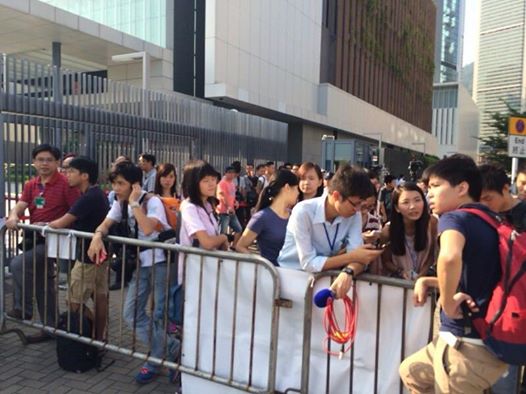Students in Hong Kong are taking their struggle for democracy to government headquarters this week, after thousands gathered in a sea of white on the Chinese University campus to launch a week-long class boycott Sunday 21 September, 2014. The organising group was the Federation of Students and they estimated that 13,000 people gathered at the Sha Tin campus – including teachers, plus secondary school pupils and the public, including local and mainland students.
“The turnout is encouraging,” secretary general Alex Chow Yong-kang said to the South China Morning Post newspaper (SCMP). “This is not just a matter for the students, but for Hongkongers as a whole.”
Chow called on the public to join the struggle during the week as the venue switches to Tamar Park, outside government headquarters in Admiralty. Protesters are to make their demands at the office of Chief Executive Leung Chun-ying, where the Executive Council meets, among them that the CE meets with the students.
Chow, speaking for the students said the demands are: allow the public to nominate candidates for chief executive in 2017; abolish functional constituencies in the Legislative Council; and apologise for and retract Beijing’s ruling on limiting political reform. If the government refuses, he said, Leung, Chief Secretary Carrie Lam Cheng Yuet-ngor and key ministers should quit.
No gray areas there!
Last month, Beijing ruled that while Hong Kong could pick its ‘leader’ – why Hong Kong needs a ‘leader; no one knows, as what is required is simply a spokesperson for the Government – by “one person, one vote” in 2017, though only two or three candidates could run. These must win majority support from a 1,200-strong nominating committee that is widely seen to be dominated by pro-Beijingers, effectively dumping those potential candidates taking a tougher stance on Beijing.
Problem is, this issue is dividing Hong Kong society. The SCMP news story quotes Tammy Yiu, a first-year student studying social work at the private Shue Yan University, who skipped two lectures to attend. “I don’t want to remain silent,” she is quoted saying, “when society is being divided, I do not want to stand on the wrong side.”
Thing is, which is the ‘wrong side’?
The bocott is seen as an early consequence and precursor to Occupy Central’s continuing action in Hong Kong. The intent is a civil disobedience exercise where multitudes are expected to block roads to demand more open democracy and at an earlier moment than Beijing has thus far ascribed.
Occupy co-organiser Dr Chan Kin-man, a Chinese University sociologist, did not go so far as to urge his institution’s students to strike, but stated he was pleased that almost two-thirds of the sociology student body took part.
In a better-than-nothing statement the Government said that it respected students’ pursuit of democracy, but believed it was better for political development to take a step forwards rather than stand still. By this they inferred, standing still could mean – a step backward, because Beijing may well stiffen its stance on the matter and retain its holding options even longer till things settle down in Hong Kong.
Not everyone agrees with the Occupy Central activities. In fact, one sector’s view has it that what started out as an almost farcical campaign that wanted to cash in on the really revolutionary Occupy Movement that had its origins in Tunisia then got more attention with the Madrid 15M and Wall Street spin offs, is skew whiffing the creative anarchism of the original Occupy Movement.
Also, it disregards all that Hong Kong has by of democratic rule now, as if one-man-one-vote would solve all the problems but without a really participatory system there is no guarantee of anything other than the same formal democracy – talking heads all self seeking for there particular faction.
However, it is refreshing to see these young people on the streets and in lively discussion on the issues and taking the limelight from the stuffy and misconstrued older generation – as the street is the best classroom to learn political activism and it’s a wake-up call to Hong Kong.










